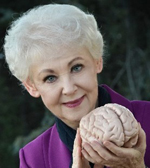Part 13 - EQ & Relationships
Magic of Emotional Intelligence - Part 13
EQ & Relationships
©Arlene R. Taylor, PhD www.ArleneTaylor.org

The human brain is a relational organ. How you approach relationships is as unique as your own brain. Your most important relationship is the one you have with yourself. You are the only person who will be with you for your entire life. The way you treat others tends to mirror how you treat yourself.
Daniel J. Goleman, PhD, has pointed out that one aspect of successful relationships is not just how compatible you are with each other, but how you deal with incompatibility—present by degrees in every relationship. When EQ skills are slim to none, family relational patterns from the past play out in present relationships without the individuals necessarily even being aware.
High EQ helps you identify what feels good, what feels bad, and how to get from bad to good in a way that results in positive outcomes. Because the brain likes to feel “good,” it may push you—based on past experience— toward behaviors it thinks can help you feel “good” or at least feel “better.” There is a healthy feeling good with positive outcomes and a pseudo feeling good with negative outcomes, typically involving addictive or dysfunctional behaviors.
Paying attention allows you to build emotional connections with others. Simple inattention kills connection, empathy, and compassion. Stop checking your cell phone repeatedly. Turn off electronics periodically. Exchange quality attention in the moment. This can help you achieve safe, resilient, healthy, and rewarding relationships.
Building EQ skills helps you differentiate between caring and manipulation, between offering help when it is genuinely needed and simply giving in to another’s every wish or demand or imposing your own preferences. After all, knowing what someone else thinks and wants does not mean always agreeing with them. Every brain on Planet Earth is unique with its own opinions, which may differ from yours.
EQ skills help you make ethical and moral decisions about how to take care of yourself and how to respond to others appropriately. High EQ assists you in developing healthy and reciprocal relationships. You take care of your own needs and some wants, while sharing and receiving in balance from others!

